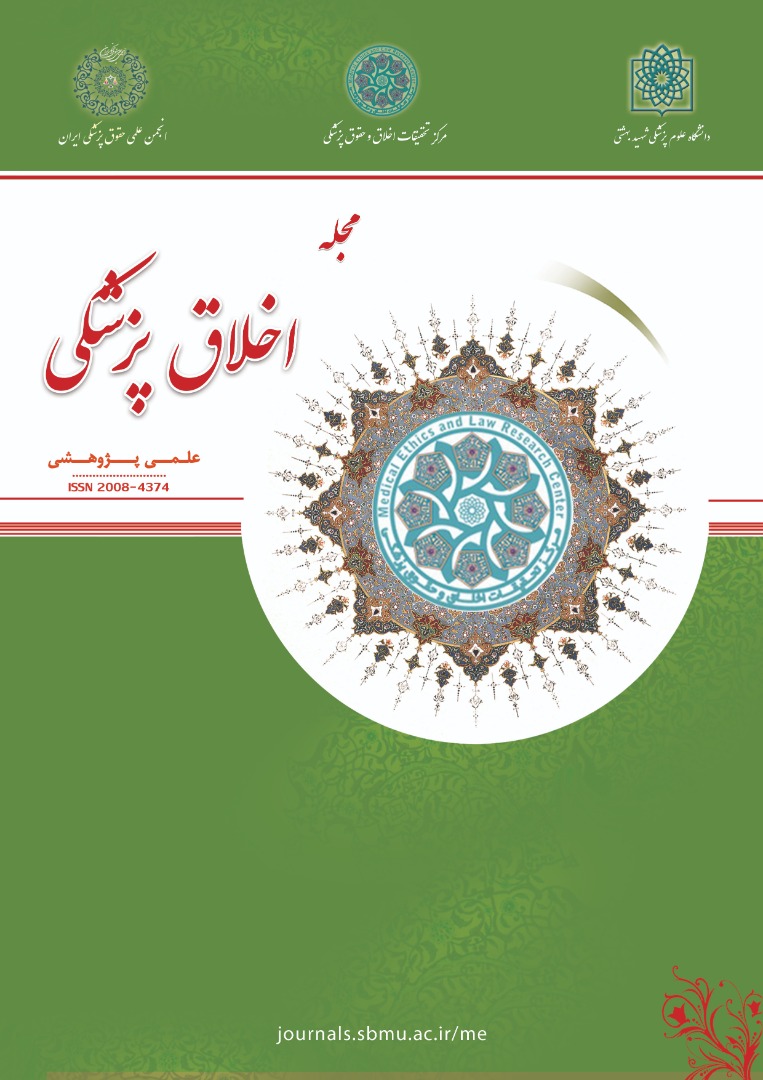تأثیر آموزش کارگاهي و پیگیری بر حساسیت اخلاقی پرستاران
مجله اخلاق پزشکی - علمی پژوهشی,
دوره 6 شماره 21 (1391),
14 May 2014
,
صفحه 11-24
https://doi.org/10.22037/mej.v6i21.4161
چکیده
حساسیت اخلاقی توجه به ارزشهای اخلاقی و لحاظکردن آن در تصمیمها و در نظرگرفتن نقش و وظیفه آن به خصوص در مواجهه با شرایط ویژه است. با توجه به نیاز به شناسایی روشهای آموزشی مؤثر در افزایش حساسیت اخلاقی در پژوهش حاضر تأثیر آموزش کارگاهی و پیگیری آموزش بر حساسیت اخلاقی پرستاران مورد سنجش قرار گرفت.
در این پژوهش مداخلهای از نوع سری زمانی 25 پرستار در کارگاه دو روزه با موضوعات اخلاقی شرکت کردند و سپس به مدت دو ماه آموزش به صورت پیگیری از طریق پیامهای اخلاقی دریافت نمودند. از پرسشنامه حساسیت اخلاقی «هان» برای جمعآوری اطلاعات استفاده شد. دادهها به وسیله آزمون منویتنی یو و فریدمن تجزیه و تحلیل شدند. تمام ابعاد حساسیت اخلاقی پس از انجام آموزش به وسیله کارگاه و پیگیری افزایش یافتند (P<0.05). کارگاه تأثیر قابل ملاحظهای بر حساسیت اخلاقی پرستاران دارد که با پیگیری این آموزش میتوان اثرات آنرا حفظ نمود.
- حساسیت اخلاقی؛ پرستار؛ کارگاه، پیگیری؛ آموزش کارگاهی
ارجاع به مقاله
مراجع
الف ـ منابع فارسي:
حسنپور، مجید. حسینی، محمدعلی. فلاحی خشکناب، مسعود. عباسزاده، عباس. (1390 ش.). بررسی تأثیر آموزش اصول اخلاق پرستاری بر حساسیت اخلاقی در تصمیمگیری پرستاران بیمارستانهای تأمین اجتماعی استان کرمان سال 1389. مجله اخلاق و تاریخ پزشکی، 4 (5). صص 64-58.
ب ـ منابع انگليسي:
Akabayashi, A. Slingsby, BT. Kai, I. Nishimura, T. Yamagishi, A. (2004). The development of a brief and objective method for evaluating moral sensitivity and reasoning in medical students. BMC Med Ethics, 5, E1. doi: 10.1186/1472-6939-5-1]1-5-6939-1472.
Al-Ansari, EM. (2002). Effects of gender and education on the moral reasoning of Kuwait university students. Social Behavior and Personality: an international journal. 30(1): 75-82.
Ambrose, D. Cross, T. (2009). Morality, ethics, and gifted minds: Springer.
Baeroe, K. Norheim, OF. (2011). Mapping out structural features in clinical care calling for ethical sensitivity: a theoretical approach to promote ethical competence in healthcare personnel and clinical ethical support services (cess). Bioethics. 25(7): 394-402.
Begat, I. Ikeda, N. Amemiya, T. Emiko, K. Iwasaki, A. Severinsson, E. (2004). Comparative study of perceptions of work environment and moral sensitivity among Japanese and Norwegian nurses. Nurs Health Sci. 6(3): 193-200.
Ersoy, N. Goz, F. (2001). The ethical sensitivity of nurses in Turkey. Nurs Ethics. 8(4): 299-312.
Ersoy, N. Gundogmus, UN. (2003). A study of the ethical sensitivity of physicians in Turkey. Nurs Ethics. 10(5): 472-84.
Gallagher, Ann. Tschudin, Verena. (2010). Educating for ethical leadership. Nurse Education Today. 30(3): 224-27.
Grady, C. Danis, M. Soeken, KL. O'Donnell, P. Taylor, C. Farrar, A. Ulrich, CM. (2008). Does ethics education influence the moral action of practicing nurses and social workers? Am J Bioeth. (4): 4-11.
Han, SS. Kim, J. Kim, YS. Ahn, S. (2010). Validation of a Korean version of the Moral Sensitivity Questionnaire. Nurs Ethics. 17(1): 99-105.
Kim, YS. Park, JW. You, MA. Seo, YS. Han, SS. (2005). Sensitivity to ethical issues confronted by Korean hospital staff nurses. Nurs Ethics. 12(6): 595-605.
Lutzen, K. Blom, T. Ewalds-Kvist, B. Winch, S. (2010). Moral stress, moral climate and moral sensitivity among psychiatric professionals. Nurs Ethics. 17(2): 213-24.
Lutzen, K. Dahlqvist, V. Eriksson, S. Norberg, A. (2006). Developing the concept of moral sensitivity in health care practice. Nurs Ethics. 13(2): 187-96.
Lutzen, K. Johansson, A. Nordstrom, G. (2000). Moral sensitivity: some differences between nurses and physicians. Nurs Ethics. 7(6): 520-30.
Mayhew, BW. Murphy, PR. (2009). The impact of ethics education on reporting behavior. Journal of Business Ethics. 86(3): 397-416.
Murayama, S. (2010). Cultural sensitivity removes barriers to better care. A letter to the editor on article "parental preference or child well-being: an ethical dilemma". J Pediatr Nurs. 25(2): 71.
Ohnish, K. Ohgushi, Y. Nakano, M. Fujii, H. Tanaka, H. Kitaoka, K. Narita, Y. (2010). Moral distress experienced by psychiatric nurses in Japan. Nurs Ethics. 17(6): 726-40.
Robinson, R. (2010). Registered nurses and moral distress. Dimens Crit Care Nurs. 29(5): 197-202.
A. Rogers-Serin, L. (2003). Validation of a measure of ethical sensitivity and examination of the effects of previous multicultural and ethics courses on ethical sensitivity. Ethics & Behavior. 13(3): 221-35.
Yarbrough, S., & Klotz, L. (2007). Incorporating cultural issues in education for ethical practice. Nursing ethics. 14(4): 492-502.
- چکیده مشاهده شده: 1259 بار
- PDF (English) دانلود شده: 1503 بار
